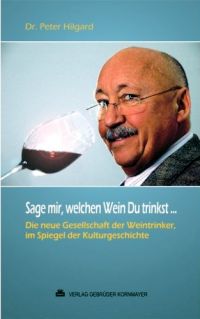
European cultural history, the humanities and wine - it is a richly broad field that the author ploughs. In his book "Sage mir, welcher
Wein Du trinkst" (Tell me what wine you drink), the physician, wine merchant and
vintner Dr. Peter Hilgard attempts to create a "sociology of wine drinkers". But that's not all: he wants to fathom the "new society of wine drinkers in the Spiegel of cultural history".
So Hilgard has taken on a
lot - and fails. For it is difficult to discern a thread running through the vast topic. "How did wine culture actually begin? Fermented grape juice was already preferred to water as a drink by our species, the human race, in ancient times." Such sentences are neither entertaining nor scientific; and the accumulation of non-concretisms such as "possibly", "probably" and "presumably" show that in his work Hilgard primarily puts down on paper his own drafts of thoughts, which, despite organising chapters, touch on much and finish little. It is about nothing less than wine and women, health problems, globalisation,
terroir, popular belief, commerce, Eros and the future.
Galloping through literature and sociologyAt a pig's gallop through the centuries and sources, the reader gets a little dizzy: Wine quotes from the Gilgamesh epic and the medieval "Laienspiegel", from
Goethe, Wilhelm
Busch, from Proust and Shakespeare. The
French sociologist Pierre Bourdieu makes a brief appearance, as does Aristophanes' "Lysistrata". The famous "Sudelbücher" by the writer and Enlightenment philosopher Johann Christoph
Lichtenberg provide some intelligent aphorisms on the subject; and even Sigmund Freud's theory of "sublimation" and the milieu study approach of the market research institute Sinus are given space.
The insight remains meagre
But what is thesis, what is proof? Which strand does the idea follow, what are its premises? In the end, the insight of the smorgasbord remains meagre: after 114 pages, for example, the chapter on "Wine Globalisation or Terroir" ends with the sentence: "Tell me what wine you drink and I'll tell you who you are - this is not only a variation of Brillat-Savarin's famous sentence and the title of the book, but probably also an important principle of wine-drinking sociology" Well then. So Dr. Peter Hilgard may have put some interesting ideas on paper now and then in well-formulated sentences, but he has made a big mistake with the size and depth of the subject. A sentence by the famous
French chemist
Louis Pasteur may comfort him: "There is more philosophy in a bottle of wine than in all the books in the world
This book at AmazonDr. Peter Hilgard: Sage mir, welcher Wein Du trinkst Die neue Gesellschaft der Weintrinker, im Spiegel der Kulturgeschichte, Kornmayer Verlag, 156 pages, 14,95 , ISBN-10: 3938173343
 European cultural history, the humanities and wine - it is a richly broad field that the author ploughs. In his book "Sage mir, welcher Wein Du trinkst" (Tell me what wine you drink), the physician, wine merchant and vintner Dr. Peter Hilgard attempts to create a "sociology of wine drinkers". But that's not all: he wants to fathom the "new society of wine drinkers in the Spiegel of cultural history".
European cultural history, the humanities and wine - it is a richly broad field that the author ploughs. In his book "Sage mir, welcher Wein Du trinkst" (Tell me what wine you drink), the physician, wine merchant and vintner Dr. Peter Hilgard attempts to create a "sociology of wine drinkers". But that's not all: he wants to fathom the "new society of wine drinkers in the Spiegel of cultural history".